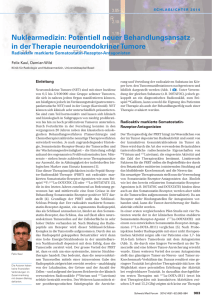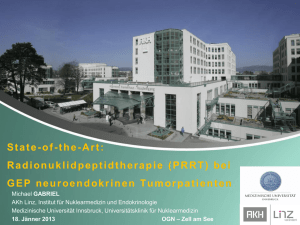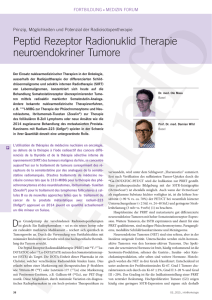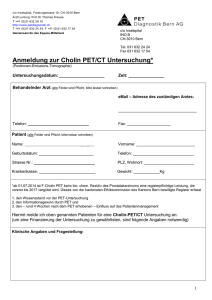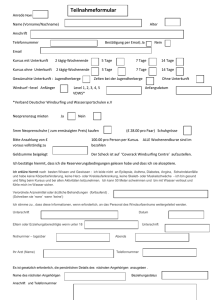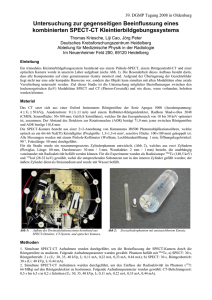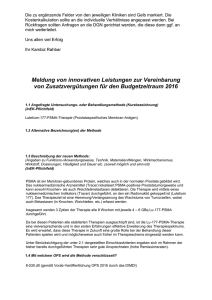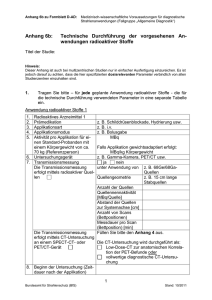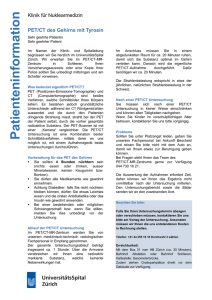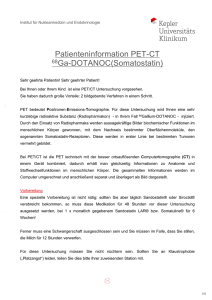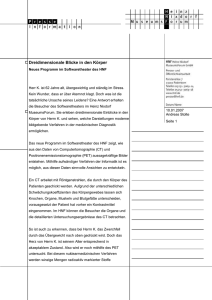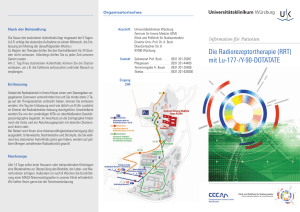Theranostik bei neuroendokrinen Neoplasien
Werbung
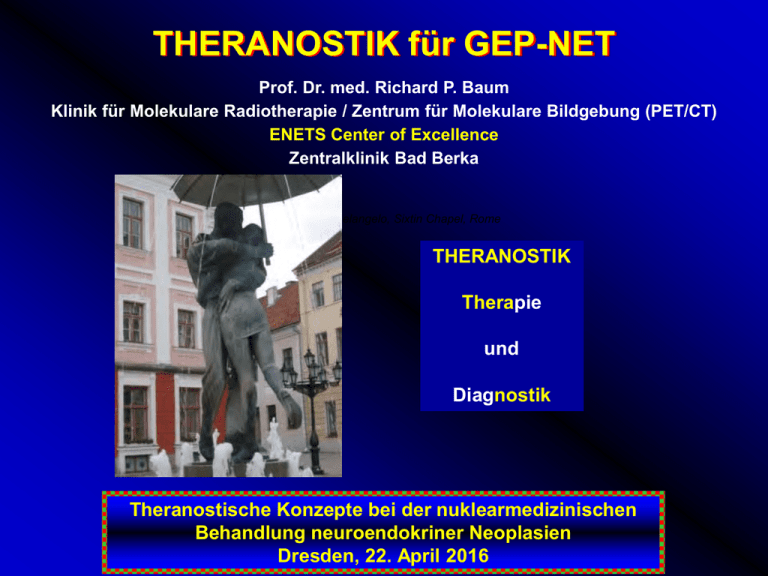
THERANOSTIK für GEP-NET Prof. Dr. med. Richard P. Baum Klinik für Molekulare Radiotherapie / Zentrum für Molekulare Bildgebung (PET/CT) ENETS Center of Excellence Zentralklinik Bad Berka Adapted from Michelangelo, Sixtin Chapel, Rome THERANOSTIK Therapie und Diagnostik Theranostische Konzepte bei der nuklearmedizinischen Behandlung neuroendokriner Neoplasien Dresden, 22. April 2016 2002 Receptor Scintigraphy Using the 99mTc-Labelled Somatostatin Analogue EDDA–TRICINE–HYNIC–TOC in 450 studies: Clinical Results In Different Tumor Types And Comparison with 111In DOTATOC During 90Y-DOTATOC Radioreceptor Therapy R.P. Baum, M. Schmücking, S. Fischer, C. Przetak, A. Niesen, H.R. Mäcke* EDDA-HYNIC-TRICINE-TOC O cyclic octopeptide D-Phe HN N NH2 Thr(ol) hydracino nicotin amide =complex function for Tc Tyr D-Trp Cys Thr Lys D-Phe1-Tyr3-Octreotide HO HYNIC-TOC coligand Cys OH H N O HO HO EDDA: Ethylenediamine-N-N`-diacetic acid TRICINE heterocyclic coligand HYNIC TOC Tricine Tin Vial 2 Sterile Bottle EDDA salt Vial 1 Kit- Preparation 99mTc – EDDA – HYNIC - TRICINE –TOC 1. Dissolving of EDDA • • Addition of 0.5 ml sterile isotonic NaCl- solution to vial_1 2- 5 min intense shaking ( complete solution ! ) 2. Addition of Vial_1 to Vial_2 • 3- 5 min intense shaking 3. Addition of 0.75 ml 99mTc04- - Eluate • 500 MBq to 2.5 GBq ( no first generator eluate ! ) 4. 45- 60 min Boiling • Waterbath (Pb-shield) 5. Cooling 6. Quality Control • • Before use: HPLC - analysis and TLC Periodically: LAL (endotoxins), sterility testing Peak t=23‘ Radiochemical purity > 98 % Product stability in vitro 4 - 6 h HPLC: Flow 1.0 ml / min, LiChrosor RP-18 (5 µm) Eluate: Acetonitrile (MeCN) / H2O = 5 to 95 % MeCN Patienten-Selektion Was muss vor PRRT bekannt sein? • Histologie / Immunohistochemie - Grading, Proliferationsrate (Ki-67), CgA, Synaptophysin, hormonelle Aktivität (e.g. Glucagon, Gastrin, Insulin) • Rezeptordichte – idealerweise RezeptorPET/CT (SUV) oder Szintigraphie (Tektrotyd) • Nierenfunktion – MAG3 (TER) • Blutbild, klin. Labor – Ery, Leuko, Thrombo, Krea, BUN EJNMMI February 2013 PRRT extrapankreatisches Gastrinom 99mTc 68Ga EDDA/HYNIC-TOC Szintigrapie und DOTATOC PET/CT 261579_2016_GG Patient, 72 Jahre (zum Zeitpunkt der Diagnose 57 Jahre) Diagnose CUP-NET cTx pN1 cMx, ED 07/2001 03/2001 Zufallsbefund Lymphknotenvergrößerung (Ultraschall Abdomen) 07/2001 FNP: neuroendokriner Tumor, Proliferative Aktivität (Ki-67) 10 %, Gastrin/SSTR positiv CT / MRT: kein Primum, keine Metastasen Laparotomie, peripankreatische Exstirpation einer Lymphknotenmetastase (NET) 10/2001 postoperativ (!) Rezeptor-Szintigraphie mit Tc-99m-EDDA/HYNIC-TOC (640 MBq) 3093421 Tc-99m HYNIC-TOC Szintigraphie ( Oktober 2001) 261579_2016_GG Tc-99m HYNIC-TOC SPECT ( Oktober 2001) Primärtumor Pankreasregion Lebermetastase (8 mm) SPECT Abdomen 3093421 1. Gut differenziertes, funktionelles neuroendokrines Neoplasma (extrapankreatisches Gastrinom) mit hepatischen und lymphonodulären Metastasen, ED 03/2001 Proliferative Aktivität (Ki-67/MiB1) 10 % Immunhistochemisch Expression von Chromogranin und Synaptophysin sowie Gastrin 70 % der Tumorzellen zeigen eine membrangebunde Färbung mit SSTIIa 07/2001 Laparotomie und peripankreatische Exstirpation einer Lymphknotenmetastase eines neuroendokriner Tumor (immunhistologisch Expression von Chromogranin A) 11/2001 Peripankreatische und paraaortale Lymphkotenexstirpation sowie Resektion einer Lebermetastase aus dem rechten Leberlappen (S6), intraoperativer Einsatz Gammasonde 04/2001 Beginn Octreotid-Therapie (Sandostatin LAR 30 mg/Monat bis 12/2008, dann PD) 03-10/2009 3 Kurse einer peptidvermittelten Radiorezeptortherapie (PRRT) – PR, danach 3 Jahre SD 15.03.2012 Pankreaslinksresektion, Splenektomie, Exzision peripankreatischer/paraaortaler Lymphknoten (histologisch extrapankreatisches Gastrinom) 10/12+02/13 4. und 5. PRRT – PR, gefolgt von SD über 2.5 Jahre 11/15+02/16 6. und 7. PRRT – PR / SD 2. Adenokarzinom des Rektums, ED 01/2015 Tumorklassifikation pT2 pN1b cMx R0 pM0 G2 Stadium III 01/2015 05/2015 17.09.2015 Tiefe anteriore Rektumresektion mit Anlage eines protektiven Loop-Ileostomas Intravenöse Portimplantation via Vena cephalica dextra Adjuvante Radiochemotherapie – Radiatio des kleinen Beckens (GD bis 45,0 Gy) und Boost auf die ehemalige Tumorregion bis GD von 50,4 Gy und simultane Chemotherapie mit 5-FU Ileostomarückverlegung, peritoneale Probeentnahme 261579_2016_GG Ga-68 DOTATATE PET/CT vor PRRT (Mai 2008) 261579_2016_GG Radio-Rezeptor-Therapie (PRRT) Applikation von Applikation von Applikation von Applikation von Applikation von Applikation von Applikation von 5500 MBq Lu-177 DOTATATE am 24.03.2009 (1. Kursus) 5500 MBq Lu-177 DOTATATE am 21.07.2009 (2. Kursus) 7000 MBq Lu-177 DOTATOC am 12.10.2009 (3. Kursus) 7400 MBq Lu-177 DOTATOC am 29.10.2012 (4. Kursus) 6400 MBq Lu-177 DOTATOC am 05.02.2013 (5. Kursus) 5900 MBq Lu-177 DOTATOC am 17.11.2015 (6. Kursus) 6600 MBq Lu-177 DOTATOC am 03.02.2016 (7. Kursus) Kumulativ verabreichte Aktivität 44.3 GBq (1197 mCi) Lu-177 Aktueller Tumorstatus Fortführung der Therapie Partielle Tumor-Rückbildung (Partial Remission nach RECIST und PERCIST) 261579_2016_GG Ga-68 DOTATOC PET/CT vor 7. PRRT – 15 Jahre nach ED (Februar 2016) 261579_2016_GG Lu-177 DOTATOC 7. PRRT (Februar 2016) 261579_2016_GG Molekulare Bildgebung und Therapie mit Radiopeptiden - Schlüssel-Schloss-Prinzip THERANOSTIK E SEE WHAT TREAT Schematic Representation of a W Drug for Imaging andWE Targeted Therapy Target Schloss • Antigene (e.g. CD20, HER2) • GPCRs • Transporter • Enzyme & Inhibitoren Ligand Schlüssel • Antikörper • Peptide Chelator Linker Agonisten und Antagonisten 68Ga, 90Y, 177Lu Diagnostik • 99mTc, 111In, 67Ga • 64Cu, 68Gallium • Gd3+ Therapie • 177Lutetium • 213Bi, 188Re • 90Yttrium PATIENT EVALUATION BEFORE PEPTIDE RECEPTOR RADIONUCLIDE THERAPY Treatment decisons based on Ga-68 SMS receptor PET/CT The quantitative approach WE SEE WHAT WE TREAT! SUVmax = 353.7 (Highest ever recorded SUVmax at our center in a neuroendocrine tumor patient) Ga-68 DOTATOC PET/CT Aug-2015 Eur J Nucl Med Mol Imaginge 2011 Sep;38(9):1659-68 Responder – 42% reduction in SUVmax Dose to tumor – 371 Gy Ga-68 DOTATOC PET/CT Non – responder 125% increase in SUVmax Dose to tumor – 25 Gy Pankreas NET 99mTc Tektrotyd Szintigraphie und 68Ga DOTATOC PET/CT 900081_2016_MW Gut differenziertes, nonfunktionelles neuroendokrines Neoplasma der Pankreaskauda mit bilobärer Lebermetastasierung und ossären Filiae, ED 05/2013 Initiales Tumorstadium pT3 pN1(5/30) L1 V0 Pn1 pM1(HEP), R0, G2 Proliferationsrate (Ki-67) <4%, Mitoserate 8 MF/10 HPF Immunhistochemisch Expression von Chromogranin und Synaptophysin 03/2013 29.05.2013 14.04.2015 Erstsymptome (abdominelles Druckgefühl) Pankreaskaudaresektion, atypische Leberteilresektion, Splenektomie Nachweis SMS-R-positiver Lebermastastasen (Tc-99m Tektrotyd-Szintigraphie) 06/2015 Progressive Disease (deutlich Somatostatin-Rezeptor positive Lebermetastasen bilobär sowie ossäre Filiae im Ga-68 DOTATOC PET/CT) 3 Kurse peptidvermittelter Radiorezeptortherapie (PRRT) – partielle Remission 06-12/2015 Weitere Diagnosen Pankreopriver Diabetes mellitus (nicht insulinpflichtig), V.a. GIST (Ø 7 mm) in der Muscularis im Magenkorpus, leichte Anämie vor PRRT, chron. Prostatitis (Biopsie 2014 unauffällig), verplumpte Nebenniere links (V.a. noduläre Hyperplasie) 900081_2016_MW Vor PRRT - Tc-99m Tektrotyd Szintigraphie (April 2015) Ga-68 DOTATOC PET/CT (Juni 2015) 900081_2016_MW Radio-Rezeptor-Therapie (PRRT) Applikation von 6900 MBq Lu-177 DOTATOC am 03.06.2015 (1. Kursus) Applikation von 7400 MBq Lu-177 DOTATOC am 19.08.2015 (2. Kursus) Applikation von 7400 MBq Lu-177 DOTATOC am 01.12.2015 (3. Kursus) Kumulativ verabreichte Aktivität 21.7 GBq (568 mCi) Lu-177 Aktueller Tumorstatus Partielle Tumor-Rückbildung (Partial Remission nach RECIST / PERCIST) 900081_2016_MW Lu-177 DOTATOC PRRT (Juni 2015) GK ant. & post. 21 h.p.i. SPECT/CT 42 h.p.i. F-18 FDG PET (Aug. 2015) MIP image (Mismatch) 900081_2016_MW Ga-68 DOTATOC PET/CT (April 2016) – Restaging nach 3. PRRT (mPR) Overall Survival Median overall survival 59 months RADIOPEPTIDE THERAPY (ZKL BAD BERKA) 16 1 As of March 24, 2016 Patients treated n = 1380 Therapy cycles n = 4902 Lu-177 n = 3265 Y-90 n = 1637 2005 1243 Lu-177 DOTA-TATE Lu-177 DOTA-NOC 21 Y-90 3 Lu-177 Mean 3.34 GBq 6.46 GBq Max. 9,50 GBq 12.0 GBq Age: 4 – 85 years Median: 59.7 years LU-177 DOTA-TOC Lu-177-JR11 1102 511 Y-90 DOTA-TATE Y-90 DOTA-NOC Y-90 DOTA-TOC Y-90-other Center for Molecular Radiotherapy, Zentralklinik Bad Berka Primary tumors of patients with metastatic NETs treated by PRRT (n=1318 patients) 500 450 425 400 350 323 300 250 200 150 100 50 0 177 141 87 56 28 25 20 16 9 5 5 1 1972 1987 Autoradiography 1984 1991 1992 1993 1994 Scintigraphy 1987 1996 2000 2012 PRRT 1994 Courtesy Lisa Bodei • somatostatin first isolated (Roger Guillemin) • octreotide synthesis • scintigraphy with 123I-octreotide • 111In-octreotide first employed • five G-protein coupled somatostatin receptors (sst1–5), identified and cloned • 111In-octreotide registered (OctreoScan) • First PRRT with high-dose 111In-octreotide • First 90Y-octreotide PRRT- 20 years ago • First 177Lu-octreotate PRRT • Phase III registration trial of 177Lu-octreotate NETTER-1 trial: First results reported at ESMO 2015 First Presentation at ESMO, Sep. 27, 2015 (Vienna) 177Lu-Dotatate Significantly Improves Progression-Free Survival in Patients with Midgut Neuroendocrine Tumours: Results of the Phase III NETTER-1 Trial Jonathan Strosberg1, Edward Wolin2, Beth Chasen3, Matthew Kulke4, David Bushnell5, Martyn Caplin6, Richard P. Baum7, Erik Mittra8, Timothy Hobday9, Andrew Hendifar10, Kjell Oberg11, Maribel Lopera Sierra12, Philippe Ruszniewski13, Dik Kwekkeboom14 on behalf of the NETTER-1 study group 1 Moffitt Cancer Center, Tampa, FL 33612, USA;2 Markey Cancer Center, University of Kentucky, Lexington, KY 40536-0093, USA;3 University of Texas MD Anderson Cancer Center, Houston, TX 77030, USA;4 Dana-Farber Cancer Institute, Boston, MA 02215, USA;5 University of Iowa, Iowa City, IA 52242, USA;6 Royal Free Hospital, London, United Kingdom;7 Zentralklinik, Bad Berka, Germany;8 Stanford University Medical Center, Stanford, CA 94305, USA;9 Mayo Clinic College of Medicine, Rochester, MN 55905, USA;10 Cedars Sinai Medical Center, Los Angeles, CA 90048, USA;11 University Hospital, Uppsala University, Uppsala, Sweden;12 Advanced Accelerator Applications, New York, NY 10118, USA;13 Hopital Beaujon, Clichy, France;14 Erasmus Medical Center, Rotterdam, Netherlands Presentation Presidential Session II of the 18th ECCO – 40th ESMO – European Cancer Congress 2015, 27 September 2015, abstract 6LBA, Vienna 35 N = 229 (ITT) Number of events: 90 Progression-Free Survival • 177Lu-Dotatate: • 23 Oct 60 mg LAR: 67 177Lu-Dotatate Median PFS: Not reached Hazard ratio : 0.21 [0.129 – 0.338] p < 0.0001 79% reduction in the risk of disease progression/death Octreotide LAR 60 mg Median PFS: 8.4 months Estimated Median PFS in the 177Lu-Dotatate arm ≈ 40 months All progressions centrally confirmed and independently reviewed for eligibility (SAP) Presentation Presidential Session II of the 18th ECCO – 40th ESMO – European Cancer Congress 2015, 27 September 2015, abstract 6LBA, Vienna 36 Overall Survival (interim analysis) 0.5 N = 229 (ITT) Number of deaths: • 177Lu-Dotatate: • Octreotide 60 mg 35 LAR: 13 22 p=0.0186 Presentation Presidential Session II of the 18th ECCO – 40th ESMO – European Cancer Congress 2015, 27 September 2015, abstract 6LBA, Vienna 37 Summary and Conclusions • Final analysis: In this first prospective randomized study in patients with progressive metastatic midgut NETs, 177Lu-Dotatate was superior to Octreotide 60 mg in terms of: − PFS (not reached vs 8.4 months, p<0.0001) • • • • − ORR (19% vs 3%, p<0.0004) Treatment with 177Lu-Dotatate induce a 79% reduction in the risk of disease progression/death (Hazard ratio : 0.21) Interim analysis suggests increased OS (13 vs 22 deaths), to be confirmed by final analysis( Currently available safety data confirm the results of Phase I-II study, with favorable safety profile While few treatment options are available for patients progressing under SSAs, 177Lu-Dotatate appears as a major advance for this patient population Presentation Presidential Session II of the 18th ECCO – 40th ESMO – European Cancer Congress 2015, 27 September 2015, abstract 6LBA, Vienna 38
